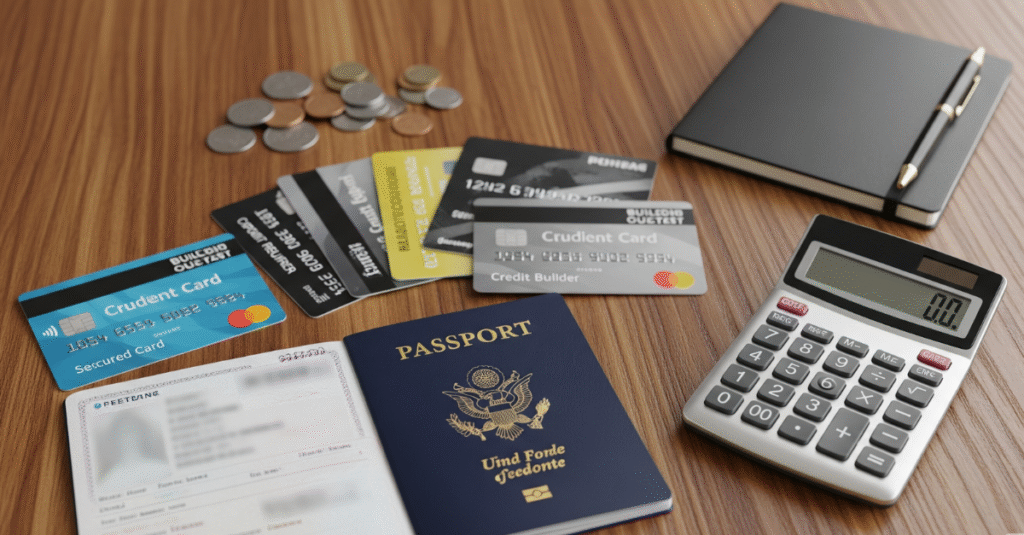Starting your financial journey with credit cards for no credit history can feel like trying to get a library card without ever borrowing a book.
In the U.S., your credit history plays a huge role in your ability to secure loans, rent apartments, and even get certain jobs.
But here’s the good news: you can get a credit card with no credit history — and if you use it wisely, it’s your fastest ticket to building a strong credit profile.

In this guide, we’ll break down the best credit cards for no credit history, explain how to apply successfully, and share tips to boost your credit score quickly.
Best Credit Cards for No Credit History in the USA (2025)
If you’ve never had a credit card, loan, or any other form of credit in your name, you have no credit history.
This means credit bureaus like Experian, Equifax, and TransUnion have no record of your borrowing behavior.
Common reasons people have no credit history:
- They’re young adults or students.
- They’ve recently moved to the U.S.
- They’ve always paid with cash or debit cards.
- They’ve never applied for credit products.
Why it matters:
Without a credit history, lenders can’t gauge your ability to repay debts. This makes you a higher-risk borrower in their eyes — but it doesn’t mean you can’t start building credit today.
How to Apply for Credit Cards for No Credit History
Absolutely — but you’ll need to focus on beginner-friendly credit cards designed for people like you.
These cards usually have lower limits, higher approval chances, and tools to help you build credit.
Many beginners start with credit cards for no credit history because they are easier to get approved for and help build credit faster.
How it works:
- Apply for a secured or student credit card.
- Make small purchases and pay them off in full each month.
- Your payment history is reported to credit bureaus.
- Over time, your credit score starts to grow.
Best Types of Credit Cards for No Credit History
When you’re starting from zero, the right credit card can make all the difference.
Here are the main categories to consider:
1. Secured Credit Cards
- Best for: People with no credit or poor credit.
- How it works: You pay a refundable deposit (e.g., $200–$500). This deposit becomes your credit limit.
- Pros: Easy approval, builds credit fast.
- Cons: Requires upfront deposit.
2. Student Credit Cards
- Best for: College students with no credit history.
- How it works: Designed for students with low or no income, often with lower limits and educational tools.
- Pros: No deposit, rewards for good grades or spending.
- Cons: Requires proof of student status.
3. Store Credit Cards
- Best for: Shoppers who frequent specific retailers.
- How it works: Can only be used at a specific store or brand.
- Pros: Easy approval, discounts, and perks.
- Cons: High interest rates, limited usability.
4. Alternative Credit Cards
- Best for: People who want modern approval methods.
- How it works: Some fintech companies approve you based on income and bank account activity, not credit score.
- Pros: No credit check, quick approval.
- Cons: May have lower limits.
Top 7 Credit Cards for No Credit History in 2025
Here’s our comparison table for the best options in the U.S.:
| Credit Card | Type | Annual Fee | Minimum Deposit | Rewards | Approval Speed |
| Discover it® Secured | Secured | $0 | $200 | 2% on gas & dining | 1–2 weeks |
| Capital One Platinum Secured | Secured | $0 | $49–$200 | None | 1 week |
| Petal® 2 Visa | Alternative | $0 | None | 1%–1.5% cash back | Instant |
| Chase Freedom® Student | Student | $0 | None | 1% cash back | 1–2 weeks |
| Citi® Secured Mastercard | Secured | $0 | $200 | None | 1–2 weeks |
| OpenSky® Secured Visa | Secured | $35 | $200 | None | 1 week |
| Deserve® EDU Mastercard | Student | $0 | None | 1% cash back | Instant |

How to Apply for Your First Credit Card
Follow these step-by-step tips for a higher approval rate:
- Check your eligibility – Read the card’s requirements.
- Gather documents – ID, proof of income, bank details.
- Choose the right card – Prefer secured or student cards.
- Apply online – Most banks have quick digital applications.
- Make your deposit (for secured cards).
- Wait for approval – Can be instant or take a few days.
- Activate your card – Start making small, regular purchases.
How to Use Your First Credit Card to Build Credit
- Pay on time – Payment history is 35% of your credit score.
- Keep your balance low – Use less than 30% of your limit.
- Avoid unnecessary fees – Pay in full to skip interest.
- Use it regularly – Small, consistent transactions are better than inactivity.
- Monitor your credit score – Use free tools like Credit Karma.
Mistakes to Avoid When You Have No Credit History
- Maxing out your card – Hurts your credit utilization ratio.
- Missing payments – Just one late payment can drop your score by 100+ points.
- Applying for too many cards – Creates multiple hard inquiries.
- Ignoring fees – Annual fees and late fees add up fast.
Frequently Asked Questions (FAQ)
Q1: Can I get a credit card without a job?
Yes, but you’ll need to show another source of income (like parental support) or apply for a secured card.
Q2: How long does it take to build credit?
You can see improvements in 3–6 months, but strong credit usually takes 12+ months.
Q3: Do prepaid cards help build credit?
No, because they’re not reported to credit bureaus.
Q4: What is the easiest card to get with no credit?
Secured cards like Discover it® Secured or Capital One Platinum Secured have high approval rates.
Conclusion
Having no credit history isn’t a permanent roadblock — it’s just the start of your financial journey.
By choosing the right beginner-friendly credit card, and using them responsibly, you can build a strong financial profile in just a few months.
📌 Pro Tip: Revisit your card choice after a year — many banks allow you to “graduate” to an unsecured card with higher limits and better rewards once your credit improves.